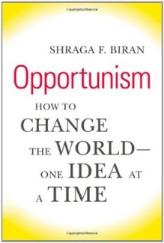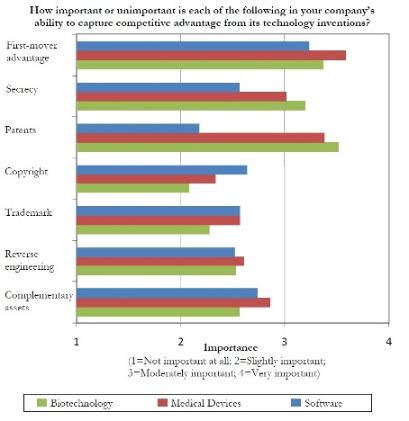Opportunism: How to Change the World- One Idea at a Time - Levi Shapiro

The US patent system is failing. Developed 231 years ago by the first US Patent Examiner, Thomas Jefferson, there is now a backlog of 1.2 million applications. Of these, almost 750,000 have never even been opened. Similarly, the number of pending Board of Patent Appeals ex-parte cases grew from 742 in 2005 to over 20,000 today. In fact, according to a study by the London School of Economics, the U.S. leads the world in the cost of forgone innovation - employers and jobs that don't exist because of the inability to obtain a patent.
Seeking to remedy the situation, the Obama Administration doubled the number of patent reviewers and championed the Patent Reform Act of 2011. However, these actions simply modify a failed system. In the new book, "Opportunity: How to Change the World- One Idea at a Time", Israeli property attorney Shraga Biran advocates a completely different approach toward intellectual property law. Biran would stimulate more economic opportunity for the creative, scientific and artistic classes by recognizing and protecting nascent IDEAS as an asset, rather than simply the finished product. He proposes a "right of opportunity" as an alternative to patent law, enabling individual members of society to more directly profit from the exploitation of their ideas.
reviewers and championed the Patent Reform Act of 2011. However, these actions simply modify a failed system. In the new book, "Opportunity: How to Change the World- One Idea at a Time", Israeli property attorney Shraga Biran advocates a completely different approach toward intellectual property law. Biran would stimulate more economic opportunity for the creative, scientific and artistic classes by recognizing and protecting nascent IDEAS as an asset, rather than simply the finished product. He proposes a "right of opportunity" as an alternative to patent law, enabling individual members of society to more directly profit from the exploitation of their ideas.
Currently, the start-up community perceives patents as a tool to inhibit innovation. That was the conclusion of a 2009 research study from UC Berkeley. Today, less than one quarter of software startups even bother to file a patent. Instead, the patent system is used by large companies to extort license fees from competitors. Pam Samuelson, one of the Berkeley report co-authors, concludes the beneficiaries of the patent system are not entrepreneurs.

The economy today is dominated by intangible wealth. According to a 2010 World Bank report by Susana Ferreira and Kirk Hamilton, 60-80% of the world's wealth is based on intangible assets. Despite this, legal frameworks ignore the contribution of intangible human, social and institutional capital while ascribing a premium to physical assets. For example, in the last quarter of the twentieth century, the patent system enabled drug companies to raise prices by 1,267% while simultaneously reducing headcount. The fantastic wealth accumulation and 40% gross margins the industry enjoyed did not accrue to individual scientists, university research labs or even the greater humanity- it went to patent holders and patent trolls.

Citing the internet as an example of social privatization, Biran puts forth a theory of opportunity as a dynamic and inclusive concept. He advocates a Registry of Ideas and Public Market to facilitate free exchange through open access. Idea owners should be able to enjoy the economic benefits of their efforts, in a system that remunerates the broad exchange of ideas. Biran's system rejects neo-liberalism in favor of new property frameworks and social privatization. "The new Opportunism can bring about a Renaissance in applied knowledge and a more stable society". While Biran's proposal is unlikely to be adopted in the short-term, most of us would agree that real, fundamental change is required. In the words of Nobel Prize winning economist Joseph Stiglitz, maintaining the current system is like "giving a massive blood transfusion to a patient that has been suffering from internal hemorrhage".
Levi Shapiro is a Partner at TMT Strategic Advisors, a research and strategy firm focusing on the technology, media and telecom sectors. He can be reached at levi@tmtstrat.com or via twitter: @levshapiro
Read all Levi's MediaBizBloggers commentaries at Unleavened Media.
Check us out on Facebook at MediaBizBloggers.com
Follow our Twitter updates @MediaBizBlogger
MediaBizBloggers is an open-thought leadership blog platform for media, marketing and advertising professionals, companies and organizations. To contribute, contact Jack@mediadvisorygroup.com. The opinions expressed in MediaBizBloggers.com are not those of Media Advisory Group, its employees or other MediaBizBloggers.com contributors. Media Advisory Group accepts no responsibility for the views of MediaBizBloggers authors.


